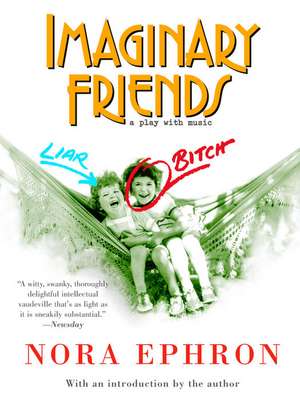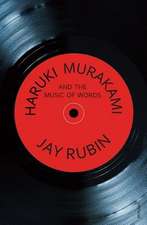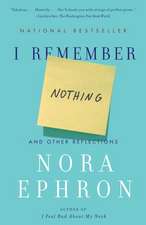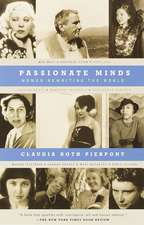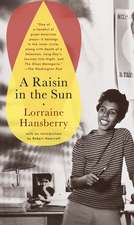Imaginary Friends: Vintage Originals
Autor Nora Ephronen Limba Engleză Paperback – 28 feb 2003
In Imaginary Friends, Nora Ephron brilliantly and hilariously resuscitates these two bigger-than-life women to give them a post-mortem second act, and the chance to really air their differences.
Preț: 82.89 lei
Nou
Puncte Express: 124
Preț estimativ în valută:
15.86€ • 16.60$ • 13.20£
15.86€ • 16.60$ • 13.20£
Carte disponibilă
Livrare economică 10-24 martie
Preluare comenzi: 021 569.72.76
Specificații
ISBN-13: 9781400034222
ISBN-10: 1400034221
Pagini: 144
Dimensiuni: 132 x 204 x 9 mm
Greutate: 0.15 kg
Editura: Vintage Books USA
Seria Vintage Originals
ISBN-10: 1400034221
Pagini: 144
Dimensiuni: 132 x 204 x 9 mm
Greutate: 0.15 kg
Editura: Vintage Books USA
Seria Vintage Originals
Notă biografică
Nora Ephron was the author of the bestselling I Feel Bad About My Neck as well as Heartburn, Crazy Salad, Wallflower at the Orgy, and Scribble Scribble. She wrote and directed the hit movie Julie & Julia and received Academy Award nominations for Best Original Screenplay for When Harry Met Sally. . ., Silkwood, and Sleepless in Seattle, which she also directed. Her other credits include the script for the stage hit Love, Loss, and What I Wore with Delia Ephron. She died in 2012.
Extras
Act I
Scene 1
A bare stage.
We see two women smoking. They are LILLIAN HELLMAN and MARY MCCARTHY. They're wearing suits and heels.
LILLIAN: Did we ever meet?
MARY: Once or twice.
LILLIAN: I don't really remember.
MARY: Well, then I don't remember, either.
LILLIAN: All right. Where was it?
MARY: At Sarah Lawrence College. Stephen Spender invited us to speak-
LILLIAN: I was invited. You turned up.
MARY: You thought I was a student because I looked quite young.
LILLIAN: I didn't even notice you.
MARY: My point. I walked onto the sunporch, and you were telling all of them a huge lie-
LILLIAN: Naturally-
MARY: -about the Spanish civil war. I couldn't bear it. You were brainwashing them, and they were looking at you like wide-eyed converts. So I interrupted and corrected you. And we had a fight. [To the audience.] And I remember that on her bare arms, she had a great many bracelets, gold and silver-
A long string with a hook on the end falls from the rafters with a bunch of gold and silver bracelets dangling from it. LILLIAN puts them on.
-and they began to tremble in her fury and surprise at being caught red-handed in a lie.
LILLIAN holds out her arm and makes the bracelets jangle against one another, louder and louder.
LILLIAN: Like that?
MARY: Exactly. The incident at Sarah Lawrence was in 1948. I was teaching there at the time-
LILLIAN: I never had to do that. I did teach, but I never had to teach. Although once, after I testified, after I stood up on the bad morning before the House Un-American Activities Committee and said-
LILLIAN and MARY: [Together.] "I cannot and will not cut my conscience to fit this year's fashions." [A beat as LILLIAN looks at MARY.]
LILLIAN: You're not suggesting I never said it.
MARY: Of course you said it.
LILLIAN: Fine. After I said it, and had to sell the farm-
MARY: It wasn't a farm. It was a house-
LILLIAN: It was too a farm. It was upstate-
MARY: Westchester County is not upstate-
LILLIAN: There were cows and chickens-
MARY: Fine. It was a farm-
LILLIAN: -after that I had no money-
MARY: -and no place to live but your New York town house-
LILLIAN: [Plunging on.]-I had no money to speak of, but I didn't teach. I went to work part-time at Macy's, selling groceries.
MARY looks at her, entirely unbelieving. After a beat, she turns back to the audience and plunges on.
Stephen Spender invited us to speak at Sarah Lawrence because we were-
LILLIAN: Women. Let's face it.
MARY: You are so right. They were having a writers' conference, and they couldn't invite only men-it was a women's college, after all-
LILLIAN: We were the logical choices.
MARY: There were others.
LILLIAN: Who?
MARY: There were plenty of others.
LILLIAN: Hmmph.
MARY: Martha Gellhorn.
LILLIAN: She was good.
MARY: She was first-rate.
LILLIAN: During the war. But then what? She took herself out of the running. She stayed in England, doomed to be known forever as Ernest Hemingway's third wife. And no one reads her anymore. Jean Stafford.
MARY: Yes, I suppose Jean Stafford.
LILLIAN: Well, I don't suppose Jean Stafford. I brought her up only to make myself seem open-minded.
MARY: And she drank herself right out of the competition, didn't she?
LILLIAN: Yes she did.
MARY: And no one reads her anymore, either.
LILLIAN: No one reads any of us.
MARY: "We all lead our lives more or less in vain. . . ." I said that only a few months before I died. I was trying to be brave . . . about cancer, and death, and the sense that it had all been . . . for nothing. To have no one know who you are after all that typing-
LILLIAN: -all that typing and thinking and drinking and flirting and fucking and feuding. But some of it was fun, wasn't it? We didn't do all that typing and thinking and drinking and flirting and fucking and feuding just so people would know who we were, did we?
A pause while they think about it.
When would you say that you and I started feuding?
MARY: From the beginning. And then, of course, the lawsuit. Lillian Hellman versus Mary McCarthy.
LILLIAN: We never liked each other.
MARY: Yes, I was always hearing you didn't like me.
LILLIAN: Well, I was always hearing you'd written mean things about me.
MARY: I didn't write much about you.
LILLIAN: When you did, it was always mean. But we rarely saw one another. That night when I turned on the television set, I had no idea what you were going to look like after all those years. I was watching, you know. I saw you say it. I was lying in bed, completely happy at seeing how badly you'd aged, and then you said it.
And now, on the scrim behind them, we see a television show projected: MARY being interviewed by DICK CAVETT.
DICK CAVETT: Are there any writers you think are overrated?
MARY: The only one I can think of is a holdover like Lillian Hellman, who I think is tremendously overrated, a bad writer, and dishonest writer, but she really belongs to the past. . . .
DICK CAVETT: What is dishonest about her?
MARY: Everything. But I said once in some interview that every word she writes is a lie, including "and" and "the."
A beat.
MARY: Most people outgrow the feuding, don't you think?
LILLIAN: Well, I never outgrew it.
MARY: Nor I.
LILLIAN: My anger-
MARY: My honesty-
LILLIAN: "You must choose your enemies well."
MARY: Who said that?
LILLIAN: Goethe. It's my favorite line from Goethe. I once read a book about two U-boats. It was written with alternating chapters, and the first was about the German U-boat. The captain woke up in the morning and trimmed his mustache and spoke to the cook about sausages. Then came the chapter about the English U-boat, and the captain woke up in the morning and looked at the starboard diesel and spoke to the cook about kippers. This went on throughout the day, day after day, alternating, until the boats finally met up with one another.
MARY: And then what happened? Did they collide?
LILLIAN: They did collide. Shall I begin?
MARY: Why not? You came first.
LILLIAN looks around. We hear music.
Music?
LILLIAN: Why not? We have musicians. [Beat.] I need . . . a fig tree.
She exits.
Scene 1
A bare stage.
We see two women smoking. They are LILLIAN HELLMAN and MARY MCCARTHY. They're wearing suits and heels.
LILLIAN: Did we ever meet?
MARY: Once or twice.
LILLIAN: I don't really remember.
MARY: Well, then I don't remember, either.
LILLIAN: All right. Where was it?
MARY: At Sarah Lawrence College. Stephen Spender invited us to speak-
LILLIAN: I was invited. You turned up.
MARY: You thought I was a student because I looked quite young.
LILLIAN: I didn't even notice you.
MARY: My point. I walked onto the sunporch, and you were telling all of them a huge lie-
LILLIAN: Naturally-
MARY: -about the Spanish civil war. I couldn't bear it. You were brainwashing them, and they were looking at you like wide-eyed converts. So I interrupted and corrected you. And we had a fight. [To the audience.] And I remember that on her bare arms, she had a great many bracelets, gold and silver-
A long string with a hook on the end falls from the rafters with a bunch of gold and silver bracelets dangling from it. LILLIAN puts them on.
-and they began to tremble in her fury and surprise at being caught red-handed in a lie.
LILLIAN holds out her arm and makes the bracelets jangle against one another, louder and louder.
LILLIAN: Like that?
MARY: Exactly. The incident at Sarah Lawrence was in 1948. I was teaching there at the time-
LILLIAN: I never had to do that. I did teach, but I never had to teach. Although once, after I testified, after I stood up on the bad morning before the House Un-American Activities Committee and said-
LILLIAN and MARY: [Together.] "I cannot and will not cut my conscience to fit this year's fashions." [A beat as LILLIAN looks at MARY.]
LILLIAN: You're not suggesting I never said it.
MARY: Of course you said it.
LILLIAN: Fine. After I said it, and had to sell the farm-
MARY: It wasn't a farm. It was a house-
LILLIAN: It was too a farm. It was upstate-
MARY: Westchester County is not upstate-
LILLIAN: There were cows and chickens-
MARY: Fine. It was a farm-
LILLIAN: -after that I had no money-
MARY: -and no place to live but your New York town house-
LILLIAN: [Plunging on.]-I had no money to speak of, but I didn't teach. I went to work part-time at Macy's, selling groceries.
MARY looks at her, entirely unbelieving. After a beat, she turns back to the audience and plunges on.
Stephen Spender invited us to speak at Sarah Lawrence because we were-
LILLIAN: Women. Let's face it.
MARY: You are so right. They were having a writers' conference, and they couldn't invite only men-it was a women's college, after all-
LILLIAN: We were the logical choices.
MARY: There were others.
LILLIAN: Who?
MARY: There were plenty of others.
LILLIAN: Hmmph.
MARY: Martha Gellhorn.
LILLIAN: She was good.
MARY: She was first-rate.
LILLIAN: During the war. But then what? She took herself out of the running. She stayed in England, doomed to be known forever as Ernest Hemingway's third wife. And no one reads her anymore. Jean Stafford.
MARY: Yes, I suppose Jean Stafford.
LILLIAN: Well, I don't suppose Jean Stafford. I brought her up only to make myself seem open-minded.
MARY: And she drank herself right out of the competition, didn't she?
LILLIAN: Yes she did.
MARY: And no one reads her anymore, either.
LILLIAN: No one reads any of us.
MARY: "We all lead our lives more or less in vain. . . ." I said that only a few months before I died. I was trying to be brave . . . about cancer, and death, and the sense that it had all been . . . for nothing. To have no one know who you are after all that typing-
LILLIAN: -all that typing and thinking and drinking and flirting and fucking and feuding. But some of it was fun, wasn't it? We didn't do all that typing and thinking and drinking and flirting and fucking and feuding just so people would know who we were, did we?
A pause while they think about it.
When would you say that you and I started feuding?
MARY: From the beginning. And then, of course, the lawsuit. Lillian Hellman versus Mary McCarthy.
LILLIAN: We never liked each other.
MARY: Yes, I was always hearing you didn't like me.
LILLIAN: Well, I was always hearing you'd written mean things about me.
MARY: I didn't write much about you.
LILLIAN: When you did, it was always mean. But we rarely saw one another. That night when I turned on the television set, I had no idea what you were going to look like after all those years. I was watching, you know. I saw you say it. I was lying in bed, completely happy at seeing how badly you'd aged, and then you said it.
And now, on the scrim behind them, we see a television show projected: MARY being interviewed by DICK CAVETT.
DICK CAVETT: Are there any writers you think are overrated?
MARY: The only one I can think of is a holdover like Lillian Hellman, who I think is tremendously overrated, a bad writer, and dishonest writer, but she really belongs to the past. . . .
DICK CAVETT: What is dishonest about her?
MARY: Everything. But I said once in some interview that every word she writes is a lie, including "and" and "the."
A beat.
MARY: Most people outgrow the feuding, don't you think?
LILLIAN: Well, I never outgrew it.
MARY: Nor I.
LILLIAN: My anger-
MARY: My honesty-
LILLIAN: "You must choose your enemies well."
MARY: Who said that?
LILLIAN: Goethe. It's my favorite line from Goethe. I once read a book about two U-boats. It was written with alternating chapters, and the first was about the German U-boat. The captain woke up in the morning and trimmed his mustache and spoke to the cook about sausages. Then came the chapter about the English U-boat, and the captain woke up in the morning and looked at the starboard diesel and spoke to the cook about kippers. This went on throughout the day, day after day, alternating, until the boats finally met up with one another.
MARY: And then what happened? Did they collide?
LILLIAN: They did collide. Shall I begin?
MARY: Why not? You came first.
LILLIAN looks around. We hear music.
Music?
LILLIAN: Why not? We have musicians. [Beat.] I need . . . a fig tree.
She exits.
Recenzii
“A sharp-eyed and even sharper-clawed memory-play. . . . Provides . . . guilty pleasures, keeping the repartee both snappy and snappish.” --The Wall Street Journal
“A feast of wit and language . . . that grows into a hair-pulling duel even Don King could appreciate.” --Los Angeles Times
“Takes the prize for audacity. . . . Two august ladies of letters as you’ve never seen them before. . . . [I]n American theater, everybody loves a bitch with style.” --The New York Times
“A witty, swanky, thoroughly delightful intellectual vaudeville that’s as light as it is sneakily substantial.” --Newsday
“Nora Ephron knows how to refine the passions of Hellman and McCarthy into glittering comedy. . . . [She] also gives her dueling heroines some swipes worthy of Clare Boothe Luce’s long-form catfight, The Women.” –-The New York Sun
“A feast of wit and language . . . that grows into a hair-pulling duel even Don King could appreciate.” --Los Angeles Times
“Takes the prize for audacity. . . . Two august ladies of letters as you’ve never seen them before. . . . [I]n American theater, everybody loves a bitch with style.” --The New York Times
“A witty, swanky, thoroughly delightful intellectual vaudeville that’s as light as it is sneakily substantial.” --Newsday
“Nora Ephron knows how to refine the passions of Hellman and McCarthy into glittering comedy. . . . [She] also gives her dueling heroines some swipes worthy of Clare Boothe Luce’s long-form catfight, The Women.” –-The New York Sun
